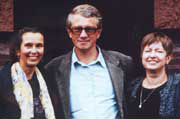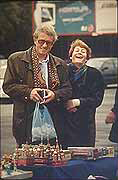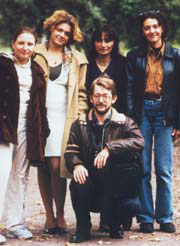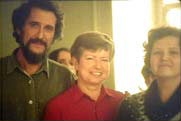
Need Help?
Email or Call: 1-800-577-4762
Email or Call: 1-800-577-4762


Sign up for our
NEWSLETTER
NEWSLETTER
Need Help?
CONTACT US
CONTACT US

Food for the Soul
Filed Under: Existential-Humanistic
In This Article…
A Call and Response to Feed My Soul
It is easy to know when the body needs food: our stomach growls, our energy level drops, or that "time of day" creeps around. But how do we know when our soul needs food? Do we take more vacations internally? Do we wish or want to be somewhere else? Are we available to hear the hunger call from the soul, and if we hear it, how do we respond as psychotherapists? How do psychotherapists feed their souls?Do we go on a retreat, meditate, vision quest, make a pilgrimage, snorkel, travel, read, garden, or just unplug the phone and computer and stay home in the solace of our own bedroom? What satisfies one will not necessarily satisfy another. It reminds me of ordering a meal with a friend and then asking, "Where did you find that on the menu?" Not that I especially wanted what she ordered, but I did not even see it.
What continually calls to me the loudest is what I have come to know as my soul call. Listening to the call is the essential ingredient. Sometimes, the call comes several times before I respond. I imagine that the soul leaves messages on my inner answering machine. Russia started calling to my soul about four years ago. Jim Bugental asked me to help train some Russian psychologists who were coming to California for a few weeks. It was a challenge that I met with enthusiasm.
Inside, I held a deep curiosity about Russians. Since childhood, I had viewed them as a mystery. Russia was also a scary place for me as a child—a place full of people who had the power to scare me into the basement of my school, make me cover my head, and pray their bomb would not fall on my school.
There was never a bomb dropped. Instead, my curiosity was engaged. Who were these people my parents and other adults feared so much? That nagging question began to be answered during this training. I engaged in many conversations with the Russians as their teacher in various classrooms and over coffee. It was clear we had many things in common. They were very gracious people and extended an open invitation for me to visit their country. The Russians were no longer a mystery, but individuals, with concerns very similar to my own: children, education, health, money, growing old, losing, gaining, and all the other multiple facets of the human condition.
It felt good to have a general invitation, but I remember clearly saying I had no interest in going to Moscow; perhaps I would like to go to St. Petersburg to see the Hermitage, the great art museum. There was really no depth to my response. I was surprised at my reaction, because travel has always fed my soul. I enjoyed the students very much, but felt no great internal push to pursue going to Russia at that time. However, a message had been left on my inner answering machine, to be retrieved in time.
Several years passed and Bugental gave me another invitation. This time it was to teach existential-humanistic psychotherapy in Russia. Now my reaction was completely different. Meeting this opportunity appealed to me. This time I answered yes to going to Russia.
Why was I open? There, from inside, a real push had manifested, a yes. How could I know what this yes was about? Was it an ego call or a soul call? Where was this yes coming from in me? Since there was little money and little recognition involved, the inner pushing did not have the feeling of an ego call.
What is a soul call? The calling is uniquely expressed in many traditions, such as the Buddhist's dharma (duty) and the Greek's daemon. I have come to respect that for each of us the call and the response is unique. There are many ways of responding to a soul call. The need to satisfy physical hunger is present daily in each of us. The push to satisfy soul hunger seems to be more evident in times of loss, life crises, conscious searching, or "wake-up calls" (at the least expected times). Such unexpected calls can happen as a child darts in front of our running car and we slam on the brakes. Several of these calls in one day usually trigger self-reflection. Is there a message in these events? If so, what is it? What do I need to look at and attend to?
Life circumstances might be comfortable or paradoxically chaotic, when a soul call comes. The Russian invitation came at a time of comfort in my life. It was a wake up-call for me—an invitation to move out of my comfort zone, to seek nourishment for my soul in a foreign land. I knew pilgrimages as a deep form of nourishment for my soul. I had been a pilgrim to the East: India, Turkey, and European countries. Now everything in me said yes to Russia. There was a subtle feeling to the yes, as if a hint were being whispered into my ear. I felt deeply excited.
A Call to Adventure
Joseph Campbell wrote in The Hero with a Thousand Faces that the hero's journey begins with the call to adventure: "The call rings up the curtain, always, on a mystery of transfiguration—a rite, or moment, of spiritual passage, which, when complete, amounts to a dying and a birth." Was this journey to Russia a hero's journey? Other psychotherapists had certainly made this journey. Were their journeys rites of spiritual passage? I had no idea at the time. Many months later, I knew this journey was definitely a spiritual feast for me. This call to adventure called upon all the stuff I am made of and more. Everything I taught, I lived..jpg) Moscow River |
I began to feed my fears by reminding myself of the ruble crisis. Then my mind would quickly switch to reassurance. I had received no e-mail telling me not to come. The voice of fear would come for more food. I would feed it with excellent morsels. Maybe the e-mail had failed. It certainly wouldn't be the first time. I could even go a step further and say this whole journey was stupid.
I was at the point of mental exhaustion when a striking blonde woman emerged from the crowd. She looked at me and said in clear English, "Seminar, seminar?" "Oh yes, yes, seminar," I gleefully responded. We politely shook hands. The truth was that I restrained myself from embracing my apparent rescuer. Needless to say, I had no clue of the fears yet to manifest to my waking consciousness.
In broken English, I was introduced to a gentleman who I understood was the professor who had been e-mailing me. We laughed about our e-mail. In very broken English, they asked where the other person was. I explained with the help of my fingers that there was only one, never two. We proceeded to the sidewalk with my luggage. I was then informed that the seminar started that night. I remembered that this was not what we had arranged, but let this communication pass as the language barrier seemed impossible in my tired state. First, they would take me to my hotel. As the door to the car opened, I communicated as clearly as possible that in the last e-mail, we had confirmed my staying with the professor and his family. They confirmed this was absolutely not true as I stepped back from the car. The woman then said in very clear English, "Football seminar!"
I responded, "Psychology seminar!"
All communication stopped as they rushed back inside the terminal. As I stood on the sidewalk with my luggage and looked inside the distant terminal, I had no clue about what was to come next. I could not help but laugh as I thought of missing my son's football game that day. And yes, if I had come for the football seminar, I might actually get some fame and money. My journey was definitely not one for the ego. At this point, I would need some heavy reliance on my soul.
It was certainly an existential moment. What were my choices? I decided to return to the terminal and wait by my arrival gate. As I pulled my bag, I looked into the terminal. For the first time, I had the very sharp awareness that the area I was walking into was filled primarily with men. There were very few women. The voice of fear came up. What am I doing here? This time a layer of courage and determination that I knew I could depend upon emerged over the fear. I had come to know this part of myself in many other circumstances in my life. I knew I would be fine. I could meet this situation with quiet resolution.
 (L. to R.) Dr. Myrtle Heery, Dr. Anatolii Naminach, Dr. Elena Korablini in Moscow |
This time I responded, "Psychology seminar?"
She smiled and immediately hugged me. I felt a physical relief for both of us as we stood for a few seconds longer in our shared hug. In excellent English she said, "Myrtle, welcome to Moscow. I am so sorry we are late. There was a terrible traffic problem."
The story of my arrival would be told and retold in Russia and America. It would be a central thread in my adventure. In so many ways, all of the human emotions that needed to come out of me did during this airport experience. My fears, doubts, mistrusts, excitement, humor, and hopes were all present. My ability to make choices, to take responsibility, and to recognize the limits of my situation were all present. The knowns and unknowns were present. My capacity to fully live the present moment was supported by a deep reverence and trust for life. I had answered my soul's call.
How are we to build a new humanity? Reverence for life. Existence depends more on reverence for life than the law and the prophets. Reverence for life comprises the whole ethic of love in its deepest and highest sense. It is the source of constant renewal for the individual and for mankind.
 Dr. Anatolii and Larissa Naminach |
Reverence for Life
The seminar in Moscow was held in a spacious, light-filled room across from a monastery, where tourists regularly step out of large tourist buses to visit. In the monastery across the street time was marked with prayer and chanting by the monks, while our time was marked with psychological exercises searching the inner worlds of the participants. In each environment—the monastery and the seminar room—there was an atmosphere of reverence for life. The pilgrimage to the monastery brought to my mind my pilgrimage to Russia—my search for meaning in my life. In this moment of great unknowns in Russia, I, along with the other participants in the seminar, was searching for meaning. Both the monastery and the seminar held a simultaneous unspoken hope, a reverence and caring for human life.The ruble was crashing and there we sat faithfully searching. I had read in the American newspapers how there was an atmosphere of great fear and insecurity in Russia.
No one knew what would happen next. In spite of the uncertain economic moment, we had a full house and participants came dressed in their finest, ready to take part. I wondered if the same seminar would even fill given a similar economic scenario in America. Dr. Naminach, my host in Moscow, and his staff were organized, caring, and eager to learn. Bugental's book, The Search for Authenticity, had just been published in Russian and was available at the seminar. There was an air of excitement.
 Colleagues in Moscow |
The work of mobilizing concern for what truly matters for the individual—an essential part of the therapeutic hour in my private practice in the U.S.—was not an issue in Russia. These were already in place due to the difficulties of daily survival. The elements that did need addressing were choicefulness and responsibility. To begin to see choices was difficult, but taking on the responsibility of a choice seemed monumental for the Russians. This underlying theme was palpable.
There were, of course, the usual human problems of relationships, children, work,
 Russian Orthodox Church St. Petersburg |
There was the long history of Stalin, Lenin, and of communism. These external systems had led the individual. Like it or not, the government told you what, when, and where to be and do. Now people had the freedom to choose, or did they? What I immediately found was that people were hesitant to take on the awesome responsibility of their lives. Now they were eager, but so many obstacles were lurking. I did what Bugental refers to as a live demonstration of our work. A volunteer from the participants would sit with me for 15 to 20 minutes and work on a concern in front of the group with me. This is not "hot seat" work from Gestalt therapy. The Russians were very familiar with gestalt work and wanted to know if this demonstration would be the same. I shared that it was not. In fact, it could be a cold seat, if that was how the participant wanted to use his or her time. The choice is made in the moment. It is a time of genuine presence for both the therapist and the volunteer. Of course, there is an element of being on stage, but I have done this so frequently that I know from experience that the audience very quickly melts and the work in front of me becomes enlivened in the moment.
I referred frequently to Bugental's forthcoming book, Psychotherapy Isn't What You Think, which I helped edit. In response to the live demonstration, the participants said it was not what they had thought it would be. These demonstrations seemed to help the participants help each other later working in pairs. The focus of the work is the moment. Psychotherapy is the lived moment, not history-taking and interpreting. In the demonstrations I continually brought each person into the moment. Sometimes I would access the moment by bringing awareness to physical gestures or citing a here-and-now emotion present in the volunteer. A simple example was my comment on one volunteer's laughter when she was with me. The awareness of that moment drew her into the next paradoxical emotion of sadness. She was eager and ready to search inside herself. Her searching took her through many emotions, images, and a decision to take action on a very difficult relationship. Another volunteer became acutely aware of crying from only one eye, a characteristic that she slowly chose to change. The ability to let both of her eyes cry echoed her need to let all of herself be present in the moment. It was frightening, yet she was able to make this courageous step in front of many people.
 St. Petersburg Colleagues |
Engraved on the Soul
In St. Petersburg, Dr. Korablini and her staff also proved wonderful hosts, fulfilling my dream of a visit to the Hermitage. The seminars followed a similar structure to those in Moscow and the accompanying excitement was also present. While working with me, one volunteer participant placed her hands in prayer position in silence for several minutes. I broke the silence by commenting that her hands were in prayer position. She nodded yes and continued. Raising her head and hands still in prayer position to the ceiling, she openly wept. I had no idea what she was weeping about, but the entire group, including myself, wept with her. It was a moment I will forever treasure. There were no words, just the physical gesture of prayer and tears streaming down her face. Much later, after the group came back from the depths of our individual souls, we accessed our spirits and flew together in the absolute delight of our unspoken experience. Perhaps, as James Hillman says, the soul is in the depths of our being while the spirit flies. We moved as a group through the depths of healing without words. The volunteer then told us she felt she could continue with the very difficult tasks confronting her life. This "soul holding" had enlivened her to be herself, to live her life with all she had available to her.Soon after this experience I returned home, to my family, my private practice, garden, music, and dog. I sometimes see this woman's face and the faces in the group weeping together etched in my memory as I trim my roses, listen to my clients, or watch my child's soccer game. The tears have been engraved on my soul.
This article was originally published in the Journal of Humanistic Psychology, Vol. 42, #3, Summer 2002, 89-101. Reprinted with permission.
Copyright © 2002, Journal of Humanistic Psychology Psychotherapy.net.
 Myrtle Heery, PhD, M.F.T. has a private psychotherapy practice in Petaluma, California, and is the director of the International Institute for Humanistic Studies (www.human-studies.com). She conducts training for psychotherapists in the United States and internationally, and publishes in existential-humanistic and transpersonal psychology. In addition, she and her husband are learning more about life from their teenage son.
Myrtle Heery, PhD, M.F.T. has a private psychotherapy practice in Petaluma, California, and is the director of the International Institute for Humanistic Studies (www.human-studies.com). She conducts training for psychotherapists in the United States and internationally, and publishes in existential-humanistic and transpersonal psychology. In addition, she and her husband are learning more about life from their teenage son.
Myrtle Heery was compensated for his/her/their contribution. None of his/her/their books or additional offerings are required for any of the Psychotherapy.net content. Should such materials be references, it is as an additional resource.
Psychotherapy.net defines ineligible companies as those whose primary business is producing, marketing, selling, re-selling, or distributing healthcare products used by or on patients. There is no minimum financial threshold; individuals must disclose all financial relationships, regardless of the amount, with ineligible companies. We ask that all contributors disclose any and all financial relationships they have with any ineligible companies whether the individual views them as relevant to the education or not.
Additionally, there is no commercial support for this activity. None of the planners or any employee at Psychotherapy.net who has worked on this educational activity has relevant financial relationship(s) to disclose with ineligible companies.

